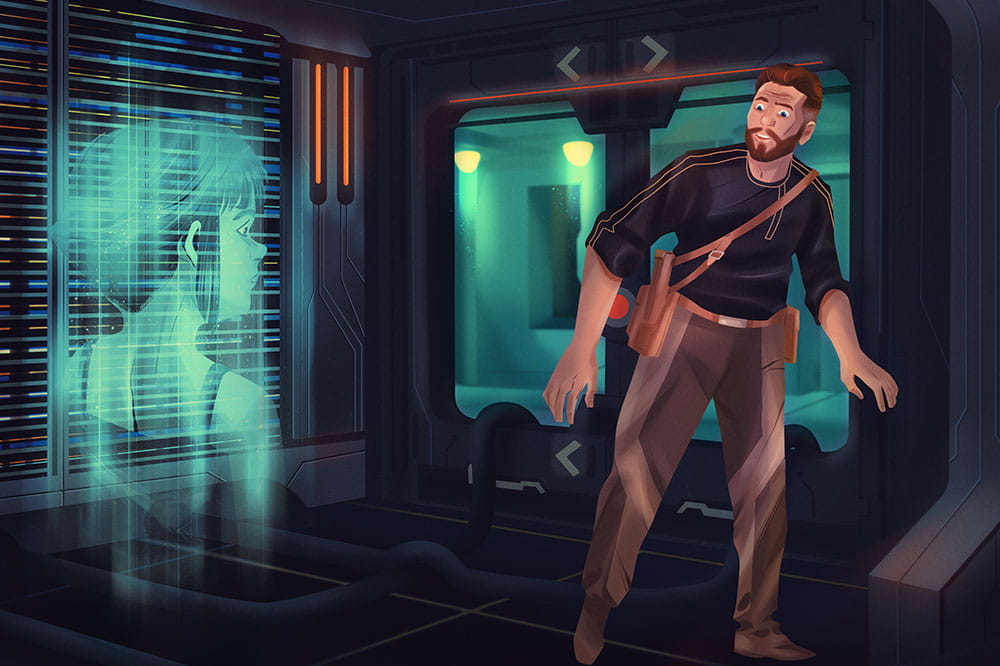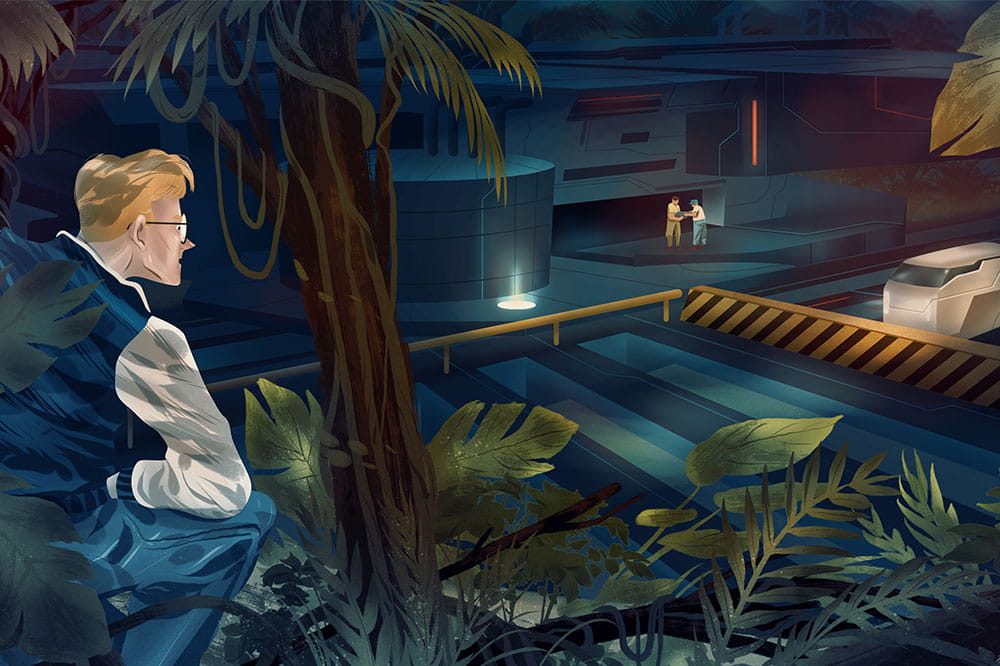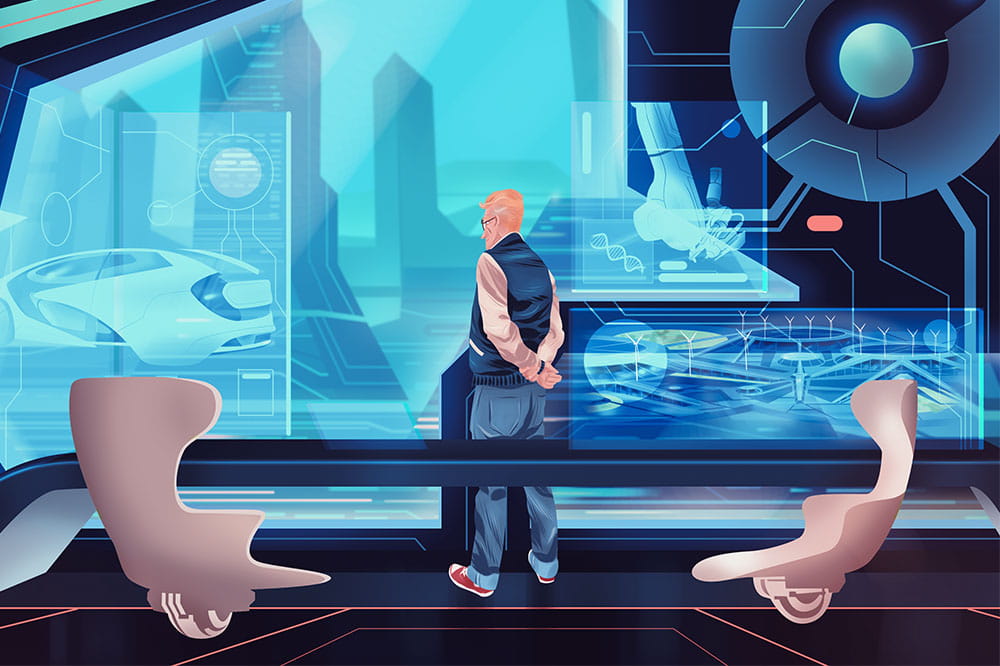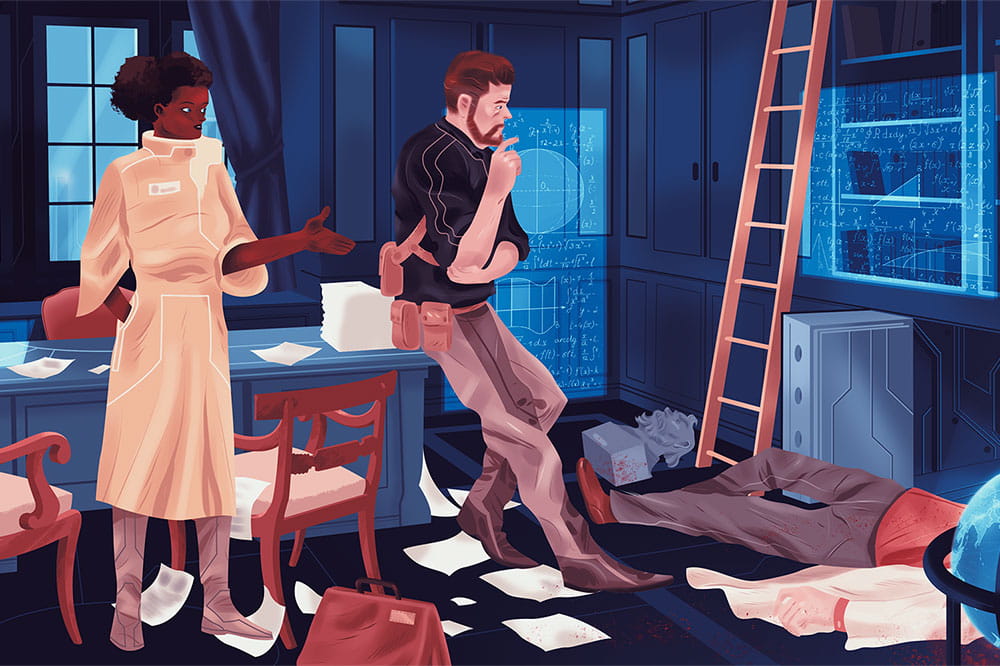Obtain news and background information about sealing technology, get in touch with innovative products – subscribe to the free e-mail newsletter.

TRAVELING INTO THE FUTURE
Each month, you can find a new chapter in the ESSENTIAL science-fiction series “Trip into the Future.” In a fictional world where the goals of the Paris climate accord have become a reality, Nero, a blogger, explores the potential technological and social transformation resulting from it. The goal of the series is to play with fully different visions as creatively as possible and to take the reader along on a thought experiment: What might our future look like – and why is it important to us?
Short Science Fiction Stories: Volume 2, Part 2
Death by Shopping
Inspector Lee was facing his trickiest case ever. The AI assistant had explained to him that the death of a political activist was a suicide – with 99.7 percent certainty. But during her lifetime, the anti-digitalization militant feared for her life. She believed the forces of artificial intelligence would exact their revenge. But was it just a conspiracy theory?
“I’m sorry, but this is right, Lee,” said Buckmayer, his supervisor.
“The case was pulled from me? Why?”
Buckmayer shrugged. “The autonomous central kanban system has decided that your skills are more urgently needed elsewhere.” His boss tapped his hologlasses with a finger, and Lee watched his eyes move from right to left. “Ortiz is taking over the case from you,” Buckmayer finally said. “But from what I can see, this is just a routine matter. We are nearing its conclusion. It’s all here. 99.7 percent certainty: Suicide. Geez, Lee, why didn’t you close this case a while ago?”

“Technology Is Our Friend and Helper”
Because I don’t really trust artificial intelligence, Lee thought. But he held his tongue. He had no proof to support his suspicions. He had been in the business long enough to know that an experienced investigator could afford to have a couple of quirks. But among his supervisors, a growing reputation as a conspiracy theorist wouldn’t be helpful.
“I have a new case for you, Lee. It’s much more interesting. A body downtown in the shopping district. It just came in. The police are already securing the area.”
Lee raised an eyebrow. “Has AI already solved it for me with 90 percent certainty and all I have to do is sign on the dotted line?”
“Don’t be so negative, Lee. Technology is our friend and helper,” Bucknayer said, and then tapped again on the side of his glasses. “Hurry, bring the auto around,” he said aloud. “Hurry” was the police organization’s AI for use in emergencies. Incidentally, “auto” had undergone a subtle change in meaning in recent years. In contrast to its earlier usage, it no longer stood for “automobile” but rather for “autonomous vehicle” – leading language purists to snidely point out that the word “automobile” had already meant “self-driving vehicle” as the century began.

What if the AI decides you’re too curious?
On the way to his rendezvous with the police car, Lee’s thoughts were given less to semantics than to the encrypted message that Nero, an investigative blogger who worked as his secret partner, had sent him. Apparently, the group of anti-digitalization militants who were ready to commit illegal acts was larger than people had thought (see Chapter 1) – as was the circle of those who fundamentally distrusted artificial intelligence. Like Hanna Karlsen, who was now dead. And who, in the view of an artificial intelligence unit, had committed suicide.
Lee shuddered a bit as he sat in the “auto” that was taking him to the scene – the old shopping mall at the center of the city. What if the self-driving AI suddenly decided that, as an investigator, he was just too curious…
Lee didn’t even glance up at large building that housed the former shopping mall or the transport drones taking off from its roof. For a decade, nearly every floor had served as a central warehouse for the city-center, allowing customers to get their deliveries as quickly as possible. Some floors also had expensive apartments. They attracted tenants with the promise that their shopping baskets would arrive at their doorsteps in minutes.
The inspector ran up to the wide pedestrian zone in front of the warehouse where a row of display windows was positioned under a large, transparent roof: They were large touchscreens where shoppers could navigate through various products. The media had called it “a revolution in shopping.” “Aren’t you tired of shopping by yourself at the computer?” Alas, shopping alone had never particularly bothered Lee.
“Forgetting to Drink – People These Days!”
Around one of the large screens, the scene was blocked off with warning tape and sound-suppressing sensors. Lee went up to the three police officers. One handed him the police AI’s investigative results.
“Collapse due to excessively low hydration,” they concluded. “Cause of death: natural. Probability 98 percent.”
Lee read the report and sighed.
“In this day and age, how is it possible for someone to forget to drink enough liquids,” he asked the police officer standing next to him. “Don’t personal AI assistants remind people?
“It’s in the report, Inspector. The individual had a retro smartwatch that suppressed the warnings from the AI assistant. Unlike the European Union, in the States we still lack a life-protection law that requires all citizens to continually use an AI assistant.”
“Lucky for us,” murmured Lee, who had never had an AI assistant. “And why didn’t the smartwatch sound the alarm instead of the AI assistant? That would’ve been its job.”
“The AI had found a 55 percent likelihood of an operating error, and 45 percent that the victim was so distracted by shopping that the individual did not check the time. But since this involves a natural death, the cause is really not important. That’s the way people are these days. If they aren’t told to drink something, they don’t drink anything. They once relied on their thirst. Now we are all relying on our assistants.”

“Info on Your Wrist – Retro Chic!”
Lee frowned: “But you can tell when you’re thirsty.”
“Yeah, yeah, that’s what you say. But some people seem to have unlearned it completely or they no longer trust their instincts. He really didn’t die of thirst. He had heart problems in combination with too little hydration while apparently standing too long in front of the touchscreen – a mix of problems.”
Lee took the golden retro watch and inspected it. He then scratched at his beard. “Why exactly do people prefer to read information on their wrist instead of having their AI assistant whisper it to them?”
“Retro chic,” the police officer answered. “You can also flaunt your wealth better this way. Showing off is harder with virtual AI assistants that no one can see. The latest Eriador XV model is even better for flaunting.
When Lee walked over to Ortiz, his junior colleague, at the office, the young detective was deep in conversation with his virtual AI assistant. Lee waited for a moment.
“Case solved, Lee?” Ortiz asked.
“The cases are all solving themselves lately,” Lee said. “The AI assistance unit spits out probabilities, and I just sign them. What’s going on with you?”
Ortiz shrugged. “99.7 percent probability of suicide. Other clues point to an unstable personality… oh, you know all that. You were there at the scene. Another discovery at the scene doesn’t change that at all. One of our colleagues came in this morning with a smartwatch. It was found a short way away, closer to the river.”
Lee perked up. “Smartwatch?”
“Quite new. The Eriador model line.”

”Karlsen wasn’t even married”
“May I take a closer look, Ortiz?”
His colleague shrugged. “The case is closed. Okay. As long as the husband doesn’t come by to make a claim. It seems to be quite valuable.”
Lee frowned: “The husband? Hanna Karlsen wasn’t even married.”
“But she wore a wedding ring.”
The inspector stared at his young colleague in complete astonishment.
“Did that escape you, Lee? But you were there at the scene. Here’s the smartwatch.”
“I wasn’t really there to investigate, Ortiz. The AI solved the case for me and made the decision,” grumbled Inspector Lee, who held the device thoughtfully in his hands. Why would Hanna Karlsen, the anti-data activist, own an advanced, high-tech smartwatch with a retro look? Why did she throw it away? And why was she wearing a wedding ring?
[Inspector Lee pursues the answers to these questions in subsequent chapters…]
More Stories About Future Files

Join Us!
Experience Freudenberg Sealing Technologies, its products and service offerings in text and videos, network with colleagues and stakeholders, and make valuable business contacts.
Connect on LinkedIn! open_in_new









